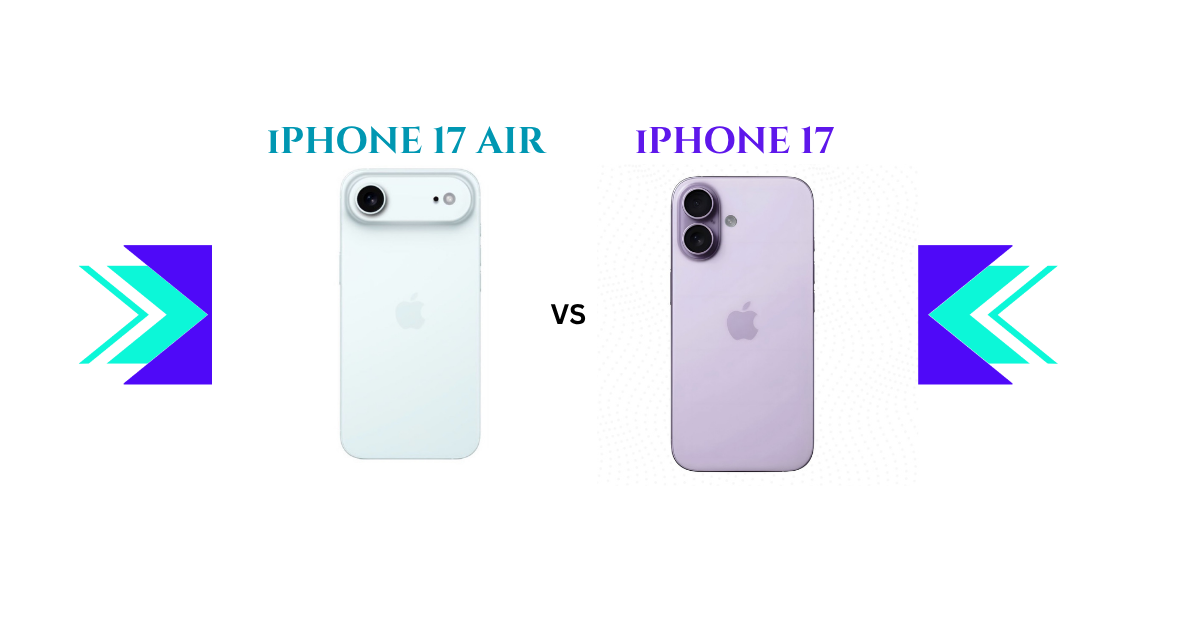Apple is set to launch the iPhone 17 lineup in September 2025, bringing several major upgrades in design, performance, and display. Among the most talked-about models this year are the iPhone 17 and the all-new iPhone 17 Air. While both offer flagship-level hardware, they are clearly designed for different types of users.
This article provides a detailed iPhone 17 vs iPhone 17 Air comparison, outlining their features, specifications, and the major differences that matter for buyers looking to make an informed decision.
Quick Overview: iPhone 17 vs iPhone 17 Air
| Feature | iPhone 17 | iPhone 17 Air |
|---|---|---|
| Display | 6.1-inch OLED, 120Hz | 6.9-inch OLED, 120Hz |
| Body Design | Aluminium, flat-edge | Titanium, ultra-slim (~5.5mm) |
| Processor | Apple A19 | Apple A19 |
| RAM & Storage | 6GB RAM, up to 256GB | 8GB RAM, up to 512GB |
| Rear Camera | Dual 48MP (Main + Ultra-Wide) | Single 48MP |
| Front Camera | 12MP | 24MP |
| Battery Capacity | ~3,200 mAh | ~2,800 mAh |
| Charging Support | 20W Wired, MagSafe | 20W Wired, MagSafe |
| Starting Price (India) | ₹89,900 (expected) | ₹99,900 (expected) |
Design and Build Quality
The iPhone 17 Air stands out for being the thinnest iPhone Apple has ever produced. At just around 5.5mm in thickness, it features a premium titanium frame, offering a futuristic design tailored for portability and aesthetics. It is noticeably lighter and slimmer, making it perfect for users who prioritize sleekness over battery size or dual-camera versatility.
In contrast, the iPhone 17 maintains Apple’s classic flat-edged design using durable aluminum. It is slightly bulkier but also more balanced in terms of grip, weight, and long-term usage comfort. For those seeking a durable and practical iPhone, the base model still holds strong value.
Display: Compact vs Immersive
Both models sport a 120Hz ProMotion OLED display, ensuring fluid visuals and vibrant color reproduction. However, the iPhone 17 Air features a 6.9-inch display, providing a wider and more immersive experience for video streaming, gaming, and multitasking.
The iPhone 17’s 6.1-inch screen is better suited for users who prefer a compact phone for one-handed use. While both offer equal refresh rates and brightness levels, the viewing experience on the Air is simply larger and more engaging.
Performance and Internal Hardware
Apple’s latest A19 chipset, based on 2nm architecture, powers both the iPhone 17 and iPhone 17 Air. This chip delivers improvements in AI processing, energy efficiency, and overall responsiveness. App launches, gaming, and multitasking are expected to run smoothly on both devices.
However, the iPhone 17 Air is reportedly equipped with 8GB RAM, giving it a slight advantage in handling heavier tasks and multitasking. The base iPhone 17 may come with 6GB RAM, which is still adequate for most day-to-day operations but slightly behind in raw multitasking potential.
Camera Capabilities
When it comes to camera systems, the iPhone 17 features a dual-camera setup with 48MP wide and 48MP ultra-wide lenses, offering more flexibility for capturing different perspectives.
The iPhone 17 Air opts for a single 48MP rear camera, focusing on simplicity and computational enhancements rather than lens diversity. However, it compensates with a 24MP front camera, which is significantly better than the iPhone 17’s 12MP front shooter. This makes the Air a more appealing option for vloggers, video calls, and selfie enthusiasts.
Battery Life and Charging
Given its slim profile, the iPhone 17 Air houses a smaller battery (around 2,800 mAh). While Apple’s chip and software optimizations help extend usage time, heavy users might find the need to recharge more frequently.
The iPhone 17 carries a larger battery, around 3,200 mAh, which translates into longer screen-on time and better endurance throughout the day. Both phones support 20W wired charging and MagSafe wireless accessories, offering flexible recharging options.
Software and Long-Term Support
Both iPhones will ship with iOS 19 and are expected to receive at least five major iOS updates. Apple continues to lead the market in software longevity, ensuring both devices remain secure and feature-rich well into the next decade.
Pricing and Availability
The iPhone 17 is likely to start around ₹89,900 in India, making it the entry point for Apple’s flagship experience in 2025.
The iPhone 17 Air, positioned as a premium lifestyle product, is expected to begin at ₹99,900. The pricing reflects its slim design, higher front camera resolution, and increased RAM.
Which One Should You Buy?
Choose iPhone 17 if:
- You prefer longer battery life
- You need a more versatile dual-camera setup
- You want the best value for money
Choose iPhone 17 Air if:
- You want a lightweight, ultra-slim phone
- You prioritize a better selfie camera
- You prefer a larger display for entertainment and reading
The difference between iPhone 17 and iPhone 17 Air lies in their design philosophy and user priorities. The iPhone 17 delivers a well-rounded experience suited for most users, while the iPhone 17 Air is crafted for those who value portability, aesthetics, and an elevated front camera experience. As Apple diversifies its flagship offerings, this comparison highlights how the company is catering to both function and form across user segments.
Also Read: Vivo X200 FE Expected to Launch at ₹54,999: Full Specs, Features, and Early Verdict

1 thought on “iPhone 17 vs iPhone 17 Air: A Complete Comparison of Apple’s 2025 Offerings”